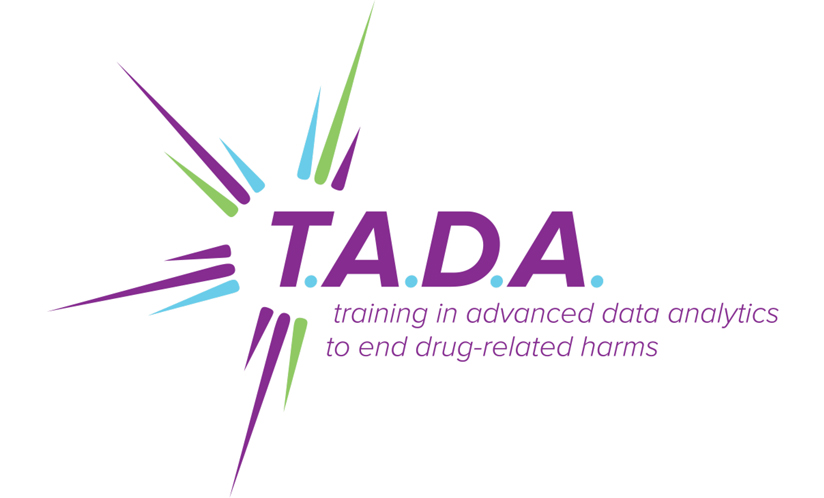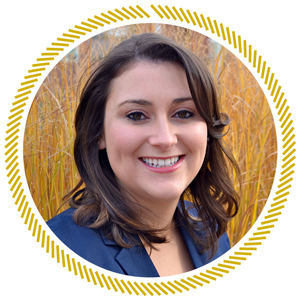Emory's TADA Program Trains Social and Behavioral Scientists with Big Data

When the Office of Behavioral and Social Sciences Research at the National Institutes of Health (NIH) did an analysis of the curricula for behavioral science graduate training programs in the U.S., they found that universities were not training graduate students how to engage thoughtfully with big data. A call for proposals for training grants for doctoral students went out in 2018, and Lance Waller, PhD, jointly appointed professor of Biostatistics and Bioinformatics and Environmental Health, saw and acted on it.
Waller immediately reached out to colleague Hannah Cooper, ScD, Rollins chair of substance use disorders and professor in the Department of Behavioral, Social, and Health Education Sciences, to see if she would be interested in collaborating on a new training grant and program designed to train social and behavioral scientists on how to use advanced data science methods with the goal of studying and intervening in drug-related harms. With Cooper’s work focused on the intersection of social influences and drug-related harm, which often utilizes administrative data and geospatial methods, and Waller’s research involving the development and application of statistical methods for spatially referenced data, a partnership was born.
Launched in 2019, the Training in Advanced Data Analytics to End Drug-Related Harms (TADA) program is a training program for social and behavioral science (SBS) PhD students that is available at only eight universities nationwide. Emory’s TADA program is unique from the others in that it is the only one to focus on skills to address substance use disorders (SUD). Supported by 45 Emory faculty mentors from 11 departments across the university, TADA prepares trainees to ethically, critically, and seamlessly integrate advanced data science methods into the SBS research lifecycle for SUD.
“This is an important program because the types of data available to social and behavioral scientists has greatly expanded in recent years. How can you include the data from everything from wearable devices to social media in studies of social and behavioral health? How can you make use of technology?” says Waller.
The TADA opportunities at Emory include both a competitive fellowship for five predoctoral students (specific programs and requirements are listed below), which is funded by a training grant from the National Institute on Drug Abuse (NIDA, part of NIH), and a new certificate opportunity for doctoral students that was launched in 2022. TADA is also funded by SPARK at Emory, the Rollins program in SUD.
“The goal of TADA is to prepare a diverse cadre of 21st century social and behavioral science researchers who will help end drug-related epidemics by applying advanced data analytics, or big data, and computational methods, such as geospatial methods, sociometric analyses, machine learning, and natural language processing,” says Marielysse Cortés, TADA program manager.
TADA Fellowship Program
The TADA Fellowship Program is tailored to predoctoral students "dedicated to a research career applying advanced data analysis methods to study and intervene in SUD-related harms." Fellows receive a two-year stipend covering their tuition and fees and $5,000 in dissertation funding. As part of the fellowship, students
- Take part in TADA’s two-semester course sequence designed to embed data science methods into the social and behavioral science research lifecycle for SUD
- Complete a summer research rotation with either the Georgia Department of Public Health or the Centers for Disease Control and Prevention
- Receive mentor matching and mentee training
- Attend regular meetings, trainings, and events for professional development and networking.
To become a TADA fellow, individuals must:
- Complete an application (priority deadlines are twice per year and remaining slots are filled on a rolling basis)
- Be committed to a research career applying advanced data analysis methods to study and intervene in SUD-related harmsave an outstanding record of academic accomplishment and an established history of engagement in research and interventions into SUDs or related harms
- Pass their comprehensive exams (or plan to complete them soon).
- Be enrolled in good standing in the Departments of Behavioral, Social, and Health Education Sciences; Health Policy and Management; Global Health; or Epidemiology (with a focus on social epidemiology) at Rollins or in Emory College of Arts and Sciences’ Sociology-Health, Anthropology, Economics, or Psychology tracks.
- Be in-residence during the first year of the fellowship or have U.S. citizenship or permanent U.S. resident status
“One of the strengths of this fellowship is that we pull from different schools across the university. Within this first cohort of three students, we had one person in public health, another in sociology, and another in psychology," says Cooper. "Innovation happens at the interplays of disciplines. One of the realizations that science has had over the past few decades is that we need to be learning from each other."
TADA Certificate Program
The TADA Certificate Program is open to all PhD students in good standing. Students enrolled in the certificate program:
- Take part in TADA’s two-semester course sequence designed to embed data science methods into the social and behavioral science research lifecycle for SUD
- Attend regularly scheduled meetings, trainings, and events
- Have access to mentoring from TADA faculty and receive training in menteeship
- May apply for up to $5,000 to support dissertation-related research expenses
To apply, students must:
- Be enrolled in a PhD program at Emory and be in good standing
- Demonstrate interest in learning and applying advanced data science analytics to end drug-related harms.
- Be prepared to engage in interdisciplinary collaboration and learning multiple software packages used to analyze big data.
“We are focused on training the next generation of social and behavioral scientists to have the tools in their analytic toolboxes to make use of the data available to them without having to rediscover how to do it. We’re never done with the toolbox—these five things will create five more things—but what’s important is what to watch for, how to evaluate and be critical consumers of the data to meet public health goals,” Waller says.
With a CDC estimate of 100,000 overdoses between April 2020-2021, this training has never been more critical. Cooper says, “One of the foremost public health challenges for the U.S. in the 21st century is drug-related harms. Overdoses have been rising steeply over the past two decades and are killing far more of us than have ever been killed before. We need to think beyond the traditional training constraints of behavioral and social scientists to try to understand and intervene in the social determinants of this crisis."
And that’s just what TADA aims to do. “My hope is that our trainees will be in the generation that will help import big data analytics into public health,” Cooper says.
For questions, email Marielysse Cortés at mcortes@emory.edu.
What SPARKed It All
“TADA is an outgrowth of SPARK,” says Cooper of the Rollins program that began in 2018. Funded by the O. Wayne Rollins Foundation, the goal of SPARK is to categorize drug-related research across Emory campus as a whole. More than 30 Emory faculty, who now make up the core faculty of TADA, come together from various schools at the university to share research and learn from one another with the ultimate intention of helping to end suffering from substance use disorders and related harms. In addition, SPARK has a grant program to fund research on drug-related harms. “We are hoping to help the next generation of junior faculty launch careers in drug-related research,” Cooper says.
Learn more about SPARK here.
Meet the TADA Fellows
Carla Jones-Harrell
School: Rollins School of Public Health
Department: Behavioral, Social, and Health Education Sciences
Graduation: August 2022 (tentative)
 Prior to coming to the BSHES department, Carla Jones-Harrell had studied and worked in the field of urban planning and health policy in areas such as natural environments and well-being, community food systems, and mental health. She became interested in researching substance use behaviors through working in mental health policy. Her current research focus is place-based characteristics of different opioid overdose risk environments.
Prior to coming to the BSHES department, Carla Jones-Harrell had studied and worked in the field of urban planning and health policy in areas such as natural environments and well-being, community food systems, and mental health. She became interested in researching substance use behaviors through working in mental health policy. Her current research focus is place-based characteristics of different opioid overdose risk environments.
“I always knew that my worldview and work would require thinking at the higher levels of the social-ecological model, but I didn't know how important and valuable it is to think creatively about using big data and applying advanced data analytic techniques. As a TADA fellow, students can choose a track of interest and the geospatial track aligned perfectly with my training goals,” says Jones-Harrell.
This training program has given Jones-Harrell the opportunity to acquire additional training in her track at Emory and at other universities and programs, such as the University of Michigan and University of Washington. Jones-Harrell has had the chance to learn about other methods from faculty here at Emory that she hadn't considered before, such as natural language processing, which she is now incorporating into her dissertation.
“Additionally, I have had the opportunity to work with an amazing team at the CDC due to our close proximity and working relationship with them! We have had a couple of meetings with other TADA sites and there are plans for even greater engagement this year. My time in the TADA program has been a phenomenal addition to my BSHES training,” says Jones-Harrell, who is currently exploring career options.
Joni Webster
School: Laney Graduate School
Department: Sociology
Graduation: May 2023
 Sociology graduate student Joni Webster decided to apply for TADA because she is interested in the mental health effects of witnessing or experiencing trauma related to police brutality in social media spaces.
Sociology graduate student Joni Webster decided to apply for TADA because she is interested in the mental health effects of witnessing or experiencing trauma related to police brutality in social media spaces.
“The murders of Oscar Grant and Trayvon Martin, as well as the COVID-19 pandemic have illustrated how social media can be used to galvanize social movements and encourage important conversations, providing opportunities to share similar experiences,” says Webster.
She adds, “While these [movements and conversations] are necessary to change and challenge dominant narratives of the Black experience, the compounding effect of identifying with victims, as well reliving experiences of racism through continued injustice and lack of accountability, can lead to poor mental health.”
The TADA program provides Webster with the natural language processing skills to analyze how police brutality affects those not directly connected to victims of homicide and vigilantism using relevant Twitter datasets.
“Working with TADA has increased my skillset and has provided me with various avenues by which I will be able to work in community settings towards translational research objectives,” she says.
Additionally, Webster notes that she has felt very supported by the program’s faculty and staff. “It is difficult to find this level of one-on-one mentorship and support at prominent research institutions where faculty are often pulled toward multiple directions and commitments and have time constraints. However, despite this, they’ve done a wonderful job of providing pragmatic career guidance to ensure that my dissertation progress aligns with my goals and research objectives.”
While she is undecided about what she’ll do after graduation, Webster says she would enjoy either working at an institution that supports teaching from a social justice framework or as a health researcher doing natural language processing work using social media data, especially as it relates to health and health care inequity.
Lauren Bertin Loeffel
School: College of Arts and Sciences
Department: Psychology
Graduation: May 2023
 “I yearn to study substance use behaviors with as much precision as investigatory tools can muster,” says Lauren Bertin Loeffel, who is studying clinical psychology. So she applied for the TADA fellowship in recognition of the invaluable opportunities it could afford her as both a scientist and clinician.
“I yearn to study substance use behaviors with as much precision as investigatory tools can muster,” says Lauren Bertin Loeffel, who is studying clinical psychology. So she applied for the TADA fellowship in recognition of the invaluable opportunities it could afford her as both a scientist and clinician.
“My intuitions were spot on,” says Bertin Loeffel.
TADA has provided Bertin Loeffel with the foundation to strengthen and expand her understanding of how typical substance use progresses to misuse; develop proficiency in sophisticated statistical and behavioral genetic methods; and utilize her clinical training to aid in how she translates findings for prevention and intervention purposes; immerse herself in various research communities to become better equipped to collaborate with fellow researchers studying addiction; and improve her ability to independently manage her own projects.
“The fellowship has brought me closer to achieving my long-term goals to contribute to the body of knowledge in addiction and to disseminate findings with an eye toward enhancing our understanding of mental health challenges and the methods we use to treat them,” Bertin Loeffel explains.
She credits the great mentorship she has received from TADA staff and faculty. “Every single one of them has demonstrated such enthusiasm to study substance use and substance use related harms. They are open to questions and really encouraging.”
After graduation, Bertin Loeffel would like to obtain a post-doctoral internship that will allow her to continue to hone some of the new analytic approaches in her toolbox. Eventually, she hopes to pursue a clinical psychology career at a hospital, academic medical center, or VA. She would like to practice and conduct research that can improve how substance use disorders are treated.